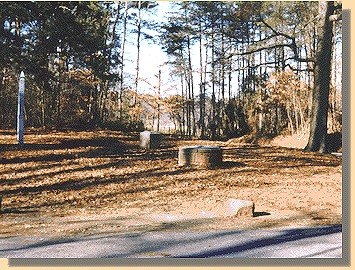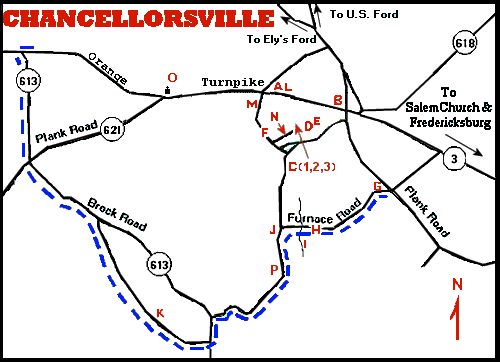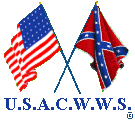
|
U. S. CIVIL WAR
PHOTOGRAPHS
|

|
CHANCELLORSVILLE

(PAGE 1 OF 8)
OUR VISIT TO CHANCELLORSVILLE
In the text, the icon  is a link to the definition of the word it marks. is a link to the definition of the word it marks.
Use your browser's "back" button to return to this page.

110th Pennsylvania Regiment at Falmouth, Va., April 24, 1863,
nearly annihilated at battle of Chancellorsville...one week later
| |
April 30-May 6, 1863
Estimated Casualties : 24,000 total
(US 14,000; CS 10,000) : 24,000 total
(US 14,000; CS 10,000)
On April 27, Maj. Gen. Joseph Hooker led the V, XI, and XII Corps
on a campaign to turn the
Confederate left flank to turn the
Confederate left flank by crossing the
Rappahannock and Rapidan Rivers above Fredericksburg. Passing the Rapidan via
Germanna and Ely's Fords, the Federals concentrated near Chancellorsville on
April 30 and May 1. The III Corps by crossing the
Rappahannock and Rapidan Rivers above Fredericksburg. Passing the Rapidan via
Germanna and Ely's Fords, the Federals concentrated near Chancellorsville on
April 30 and May 1. The III Corps was ordered to join the army was ordered to join the army via United States Ford. Sedgwick's VI Corps and
Gibbon's division via United States Ford. Sedgwick's VI Corps and
Gibbon's division remained to
demonstrate against the Confederates at Fredericksburg. In the meantime, Lee
left a covering force under Maj. Gen. Jubal Early in Fredericksburg and marched
with the rest of the army to confront the Federals. As Hooker's army moved toward
Fredericksburg on the Orange Turnpike, they encountered increasing Confederate
resistance. Hearing reports of overwhelming Confederate force, Hooker ordered his
army to suspend the advance and to concentrate again at Chancellorsville. Pressed
closely by Lee's advance, Hooker adopted a defensive posture, thus giving Lee the
initiative. remained to
demonstrate against the Confederates at Fredericksburg. In the meantime, Lee
left a covering force under Maj. Gen. Jubal Early in Fredericksburg and marched
with the rest of the army to confront the Federals. As Hooker's army moved toward
Fredericksburg on the Orange Turnpike, they encountered increasing Confederate
resistance. Hearing reports of overwhelming Confederate force, Hooker ordered his
army to suspend the advance and to concentrate again at Chancellorsville. Pressed
closely by Lee's advance, Hooker adopted a defensive posture, thus giving Lee the
initiative.
 (G) (G)
Location where Robert E. Lee and Stonewall
Jackson had their last meeting - 1998 Photograph.
On the morning of May 2, Lt. Gen. T.J. Jackson directed his corps
on a march against the Federal left flank, which was reported to be “hanging in
the air.” Fighting was sporadic on other portions of the field throughout the
day, as Jackson's column reached its jump-off point.
 At 5:20 pm, Jackson's line surged forward in an overwhelming attack that
crushed the Union (Howard's) XI Corps. Federal troops rallied, resisted the
advance, and counterattacked
At 5:20 pm, Jackson's line surged forward in an overwhelming attack that
crushed the Union (Howard's) XI Corps. Federal troops rallied, resisted the
advance, and counterattacked . Disorganization on both sides and
darkness ended the fighting. While making a night reconnaissance, Jackson was
mortally wounded . Disorganization on both sides and
darkness ended the fighting. While making a night reconnaissance, Jackson was
mortally wounded by his own men
and carried from the field. J.E.B. Stuart took temporary command of Jackson's
Corps. On May 3, the Confederates attacked with both wings of the army and
massed their artillery by his own men
and carried from the field. J.E.B. Stuart took temporary command of Jackson's
Corps. On May 3, the Confederates attacked with both wings of the army and
massed their artillery at Hazel Grove.
This finally broke the Federal line at Chancellorsville. Hooker withdrew a
mile and entrenched in a defensive “U” with his back to the river at United
States Ford. Union generals Berry and Whipple and Confederate general Paxton
were killed; Stonewall Jackson was mortally wounded. at Hazel Grove.
This finally broke the Federal line at Chancellorsville. Hooker withdrew a
mile and entrenched in a defensive “U” with his back to the river at United
States Ford. Union generals Berry and Whipple and Confederate general Paxton
were killed; Stonewall Jackson was mortally wounded.
 126 126
Salem Church - 1800's

Salem Church - 2000
On the night of May 5-6, after Union reverses at Salem Church, Hooker recrossed
to the north bank of the Rappahannock. This battle was considered by many
historians to be Lee's greatest victory.
(Text Source: U.S. Gov't, National Park Service)

| |
A -
B -
C( )
D -
E -
F -
G -
|
N.P.S. Visitors Center.
Chancellorsville Inn.
Union cannon & rifle pits, near Fairview.
Fairview House Location.
Chancellor Cemetery.
Hazel Grove.
The last meeting
|
H -
I -
J -
K -
L -
M -
N -
O -
|
Cannon fire received.
Stream crossing.
Catharine Furnace.
Jackson's Flank March.
Where Jackson was shot
Where Paxton was killed.
Indiana Monument
Wilderness Church
|
P -
Location of Wellford House.
(Letters beside the photographs refer to this map.)
JACKSON'S FLANKING MARCH
 (H) (H)
During Jackson's march around the left of the Union line, his
troops could be seen by Union forces at Hazel Grove through this
"clearing" in the woods. (This 1998 photograph was taken on the road
used by Jackson's troops, looking towards the Hazel Grove hill in
the far distance). As a result, Jackson's troops had to avoid
cannon fire at this point.
|
|
PAGE TWO
 >
Civil War Photos
>
Chancellorsville
>
Page 2
>
3
>
4
>
5
>
6
>
7
>
8
>
Civil War Photos
>
Chancellorsville
>
Page 2
>
3
>
4
>
5
>
6
>
7
>
8
Notes
|
|






 (G)
(G) At 5:20 pm, Jackson's line surged forward in an overwhelming attack that
crushed the Union (Howard's) XI Corps. Federal troops rallied, resisted the
advance, and counterattacked
At 5:20 pm, Jackson's line surged forward in an overwhelming attack that
crushed the Union (Howard's) XI Corps. Federal troops rallied, resisted the
advance, and counterattacked 126
126

 (H)
(H)